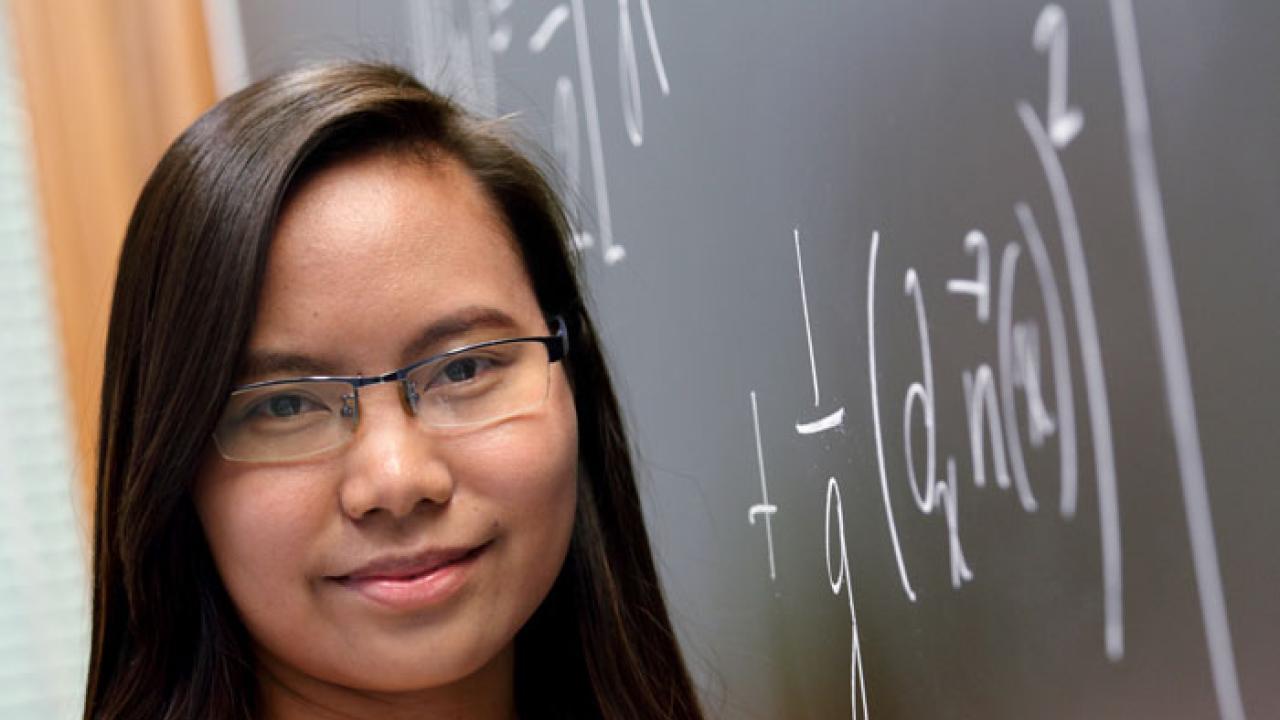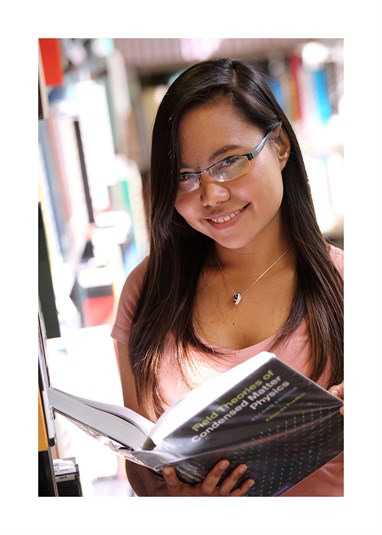
ICTP Diploma student Mary Madelynn Nayga remembers asking a lot of questions when she was little. "I was always asking questions, always staring at things, and I always loved mathematics," she recalls. "No one in my family is a scientist, so when I was young I didn't have anyone to ask." But she kept asking, and her love of mathematics didn't go away. "Before starting at secondary school, I thought that science and math were separate," she says. "I realized they're not separate at all, and physics is what connects them."
Nayga's curiosity, and her enthusiasm for physics has fueled a successful start of a career in science. After getting into the applied mathematics program at the University of the Philippines, Los Baños, she shifted over to physics at the University of the Philippines, Dilliman, and was the only woman in her class studying theoretical physics. With her math background, she began research in mathematical physics at the university's National Institute of Physics. After graduating with a bachelor's degree, she proceeded to work on her masters while teaching as part of the university's junior faculty. "I taught for two years, and I liked it," says Nayga. "It made me realize how hard it is to balance research, academics, and teaching, with lecture classes of more than a hundred students. But it was great when I was able to make my students enjoy what I taught—in fact some of them were inspired to shift to studying physics."
 With a master's degree completed, Nayga could have applied straight to PhD programs. "But I wasn't satisfied with my research output," Nayga remembers. "I wanted to experience doing serious research before applying." That aim, and the fact that two of her professors at the University of the Philippines are former ICTP Diploma students, Dr. Francis Paraan and Dr. Cristine Villagonzalo, led her to apply to ICTP's Diploma program. During her year of intensive study here, she has moved away from mathematical physics and settled happily in condensed matter physics, studying quantum spin chains and quantum phase transitions. "There's more experimental realizations," she smiles, "I appreciate my new field for its mathematical rigor—I enjoy that the most—and there are also huge developments in numerical techniques, and there are relatively doable experiments that can test theories. These three factors made me choose and love my new field."
With a master's degree completed, Nayga could have applied straight to PhD programs. "But I wasn't satisfied with my research output," Nayga remembers. "I wanted to experience doing serious research before applying." That aim, and the fact that two of her professors at the University of the Philippines are former ICTP Diploma students, Dr. Francis Paraan and Dr. Cristine Villagonzalo, led her to apply to ICTP's Diploma program. During her year of intensive study here, she has moved away from mathematical physics and settled happily in condensed matter physics, studying quantum spin chains and quantum phase transitions. "There's more experimental realizations," she smiles, "I appreciate my new field for its mathematical rigor—I enjoy that the most—and there are also huge developments in numerical techniques, and there are relatively doable experiments that can test theories. These three factors made me choose and love my new field."
Nayga found classes for the first semester of the Diploma Program to be welcome review, but the second semester brought several new challenges. Her current advisor, Marcello Dalmonte, taught one of her favorite courses, Many Body Phenomenology. "Many of the instructors at ICTP have pushed me academically, which is great training as a researcher. I got similarly good training from my advisors in the Philippines, they were always challenging me too."
Pursuing a science career in the Philippines requires a certain amount of perseverance, not the least because of a national lack of mentors. "I'm proud of my country, although there's not quite a tradition of science there," Nayga says. Recent UN statistics back up her observation: the Philippines has a very low number of researchers- 78 per 1 million citizens, compared to 3814 in Brazil and 1780 in nearby Malaysia. Government funding is most often given to applied or translational research, projects that appear to have immediate impact. But many researchers are starting to return from careers and education abroad, Nayga explains, helping to advocate and promote science and scientists in the country, with the help of social media. She, too, intends to return to the Philippines someday as a researcher and professor, helping to boost her country's research capacity. "I want to inspire more young Filipinos to do science."
But for now, Nayga's next goal is to maintain the momentum of her Postgraduate Diploma studies in the pursuit of a doctoral degree: her talent and hard work have earned her a place as a PhD student at the International Max Planck Research School for Chemistry and Physics of Quantum Materials in Dresden, Germany. Nayga is excited about continuing and expanding her studies there, and glad that she has some solid research experience from her time at ICTP. "Everyone at ICTP has been kind," Nayga says, "they've been inspirational in the way they are always learning. Here, it's okay to admit you know very little about a subject—being hungry for knowledge is a good thing." Nayga's hunger for knowledge and hard work is sure to take her far.
---- Kelsey Calhoun
















